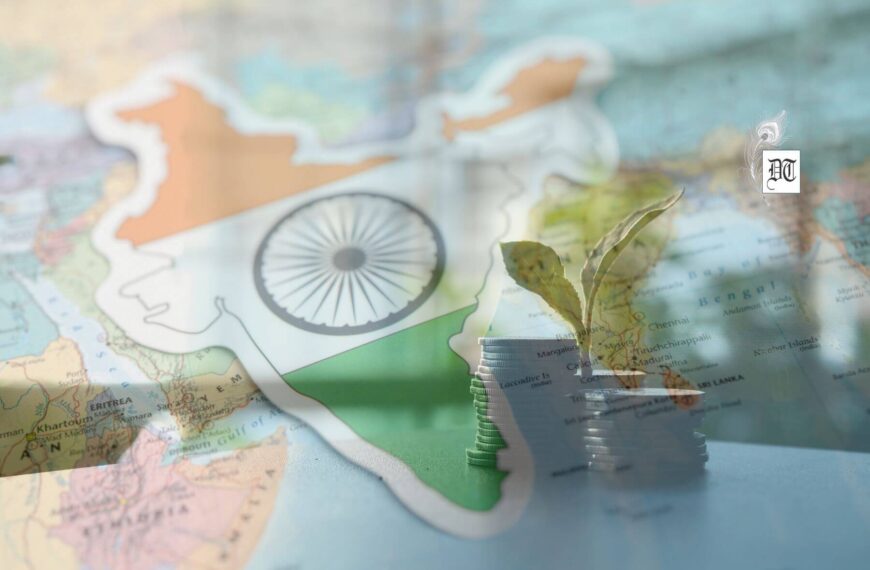There was no sign of any concern on the part of the chambers regarding the dark shadows of an escalating trade war — like it possibly resulting in a global recession or the surplus Chinese goods getting dumped in the Indian market at cheaper prices or the general price increase in the US, and the consequently inevitable federal rate hike hurting Indian imports and jacking up the cost of Indian corporate borrowing on so on. A report for Different Truths.
“US-China trade war can make Indian products competitive”— declared some newspaper headlines on 5 and 6 August 2018, reproducing verbatim the press release of the Confederation of Indian Industry (CII). One started wondering why the premier industry chambers in the country should just restrict itself to seeing only new opportunity opening up due to the unfolding trade war instead of expressing concern over the possible overall adverse fallout of it.
After examining 818 product lines where the US has raised tariffs for imports from China, the CII claimed that “top exports from India to the US which are covered in the list of items for which tariffs have been hiked include pumps, parts of military aircraft, parts for electrodiagnostic apparatus, passenger vehicles of 1500-3000 cc, valve bodies and parts of taps. Exports of these items stood at over $50 million in 2017 and can be increased with concerted efforts.”
What! Indian exports to the US in these contentious product lines amounted to a paltry $50 million only? And the key chamber of Indian industry comes up with a study calling for “concerted efforts” to increase only this? Even if it is doubled or even quadrupled it would remain paltry nonetheless. Obviously, there was something amiss with this CII figure. So one had to visit the official CII site to trace their original press release and their study to unravel this mystery. The matter reproduced in the newspaper reports was there ditto in the official press release too. But mercifully in the official press release they had given the link to a PDF file with the findings of the study and there below the press release they had given a table in which they had listed seven rows of Indian exports to the USA in these contentious areas classified into seven categories and the puzzle gets resolved if you add up these seven figures. Not just a paltry amount of $50 million, the total comes to a decent $552.3 million!
Obviously, there was a typo and in the press release text the CII itself had mentioned the figure as ‘above $50 million” instead of ‘above $500 million’. So, it is the mystery of the missing zero! Not only the erroneous figure was faithfully reproduced unverified by leading newspapers, the enigmatic ‘50’ is still entrenched there in the press release text in the official CII website! Anyway, let us overlook the stenographic error and the CII oversight.
More importantly, there was no sign of any concern on the part of the chambers regarding the dark shadows of an escalating trade war — like it possibly resulting in a global recession or the surplus Chinese goods getting dumped in the Indian market at cheaper prices or the general price increase in the US, and the consequently inevitable federal rate hike hurting Indian imports and jacking up the cost of Indian corporate borrowing on so on.
Perhaps, it is because CII is known to be circumspect about matters of politics, even if it is trade politics. But even at the political level, neither the Prime Minister nor the Ministry of External Affairs has so far commented on Trump’s highhanded trade war. On such a major development like a veritable trade war, there is only a stony silence from the Indian authorities.
Of course, to give them the due, despite their formal silence, in practice, India also promptly levied retaliatory tariffs on US when in the first round the 25% tariff hike on steel and 10% hike on aluminium by the US were not country-specific but were global tariff hikes affecting all countries. The impact of these hikes on India was estimated to be $241 million and the matching retaliatory tariffs imposed by India on US imports were of the order of $240 million. A tit for tat! Now that the US is levying country-specific duties on $50 billion worth of Chinese goods and threatening to levy more, some in India have started drooling at the new opportunity!
India’s exports in September 2017 might be lower than what it was in September 2005. But then India’s exports to the US in 2017–18 stood at $47.9 billion (as against $505 billion Chinese exports to the US), while imports were $26.7 billion. The trade balance thus is heavily in favour of India and India is also on the US hit list. But the overwhelming majority of US economists are of the opinion that Trump’s tariff hikes are no solution to the growing US trade deficits with China-EU-Canada and to reverse the long-term decline of the US economy productivity has to improve, and wage costs have to be brought down by issuing more visas to skilled migrants, and so on. In contrast, there seems to be a paradigm shift in Trump’s thinking (or, thoughtlessness!) from free trade based on the principle of comparative advantages to tariff hike brinkmanship.
The short-term “comfortable” position of the US presently in terms of GDP numbers has emboldened Trump to embark upon this trade war gamble despite warming by economists that it might precipitate a global recession. Not only India has to overcome whatever dependence it still has on US finance and technology, in the interests of solidarity with a fellow BRICS nation, and more so, in its own long-term interest, it has to come out forcefully against such high-stakes gamble by an adventurous Trump!
B. Sivaraman
©IPA Service
Photo from the Internet





 By
By

 By
By
 By
By